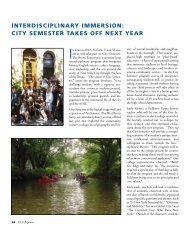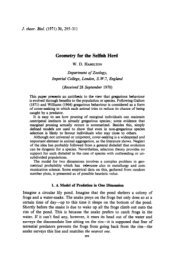More Ethics Remembered, Considered, Reconsidered
More Ethics Remembered, Considered, Reconsidered
More Ethics Remembered, Considered, Reconsidered
You also want an ePaper? Increase the reach of your titles
YUMPU automatically turns print PDFs into web optimized ePapers that Google loves.
2 ECF Reporter<br />
ECF Reporter<br />
Winter 2008<br />
Published three times during the academic year, the ECF<br />
Reporter is designed to maintain ties between the Ethical<br />
Culture Fieldston School and its alumni, as well as between<br />
the school and parents, grandparents, and friends, by sharing<br />
news and issues of importance to the ECF community.<br />
Selected content from the magazine is also posted on the<br />
school website, www.ecfs.org.<br />
ECF Reporter<br />
Ethical Culture Fieldston School<br />
33 Central Park West<br />
New York, NY 10023-6001<br />
(212) 712-6238 phone<br />
(212) 712-6296 fax<br />
reporterletters@ecfs.org<br />
www.ecfs.org<br />
editor<br />
Ginger Curwen<br />
Director of Communications & Marketing<br />
alumni news editor<br />
Toby Himmel<br />
Director of Alumni Relations<br />
design<br />
Nancy Foote/By Design<br />
assistant head of school for<br />
institutional advancement and alumni<br />
James Thompson<br />
© Copyright 2008 by the<br />
Ethical Culture Fieldston School.<br />
Cover: Ethical Culture Holiday Assembly, December 2007<br />
Inside Front Cover: Middle School Chorus Concert,<br />
January 2008<br />
Back Cover: Young Singers, Ethical Culture<br />
Holiday Assembly<br />
Cover photo, inside cover photo, and back cover photo by<br />
Diane Silverman<br />
The ECF Reporter welcomes thoughts and opinions about<br />
articles and issues of interest to the ECF community. Send<br />
them to reporterletters@ecfs.org or Reporter Letters, Ethical<br />
Culture Fieldston School, 33 Central Park West, New York,<br />
NY 10023-6001.<br />
.<br />
Letters<br />
<strong>More</strong> <strong>Ethics</strong> <strong>Remembered</strong>,<br />
<strong>Considered</strong>, <strong>Reconsidered</strong><br />
The letter, in the Fall 2007 ECF<br />
Reporter, by Staughton Lynd<br />
(himself an impressive person<br />
and a great credit to ECF) about<br />
ethics reminded me of stopping<br />
at Midtown some 35 years ago<br />
so I could once again sit in the<br />
auditorium, even if alone, and<br />
read the words arching over the<br />
proscenium. The ethical teachings<br />
and examples presented<br />
throughout ECF powerfully influenced<br />
my life. After spending<br />
seven increasingly unhappy years<br />
in the business world, I went into<br />
teaching. I had over 30 highly<br />
satisfying years and students of<br />
whom I continue to boast. Halfway<br />
through that happy career, I<br />
realized that a major motivation<br />
on my part had been to repay my<br />
ECF teachers by passing along<br />
what they had passed to me.<br />
However, there certainly were<br />
entertaining moments associated<br />
with ethics. One involved<br />
my brother, Fred (’37), who was<br />
given the honor of introducing<br />
Eleanor Roosevelt at a dinner<br />
way back when. Our father, an<br />
accomplished dinner speaker,<br />
cautioned my brother to have an<br />
introductory joke ready, and he<br />
did.<br />
Algernon Black introduced my<br />
brother, mentioning that Fred<br />
had been in his ethics class. Dr.<br />
Black explained that in an effort<br />
to introduce students to responsibility,<br />
he asked them to assume<br />
that the earth had passed through<br />
an interstellar gas that killed all<br />
adults, so now the students had<br />
to run the world. “Inevitably,”<br />
said Dr. Black, “the first period<br />
was wasted, from my point of<br />
view, by extended discussions of<br />
what to do with the bodies.”<br />
When the laughter subsided, my<br />
brother took his place at the rostrum.<br />
Discarding his prepared<br />
joke, he said, “Having had the<br />
good fortune to have been in Dr.<br />
Black’s classes, I know what to do<br />
with the bodies.” Louder laughter.<br />
An ethics teacher of mine was<br />
Ormsbee Robinson. (Has anyone<br />
come across that first name<br />
elsewhere?) He made a practice<br />
of telling short tales in which two<br />
Commandments were in opposition,<br />
and asking us how to handle<br />
the situations.<br />
(1) Your parents are starving,<br />
and in the house there is neither<br />
money nor anything to pawn. Do<br />
you steal to feed (honor) them?<br />
(2) You are waiting on a corner to<br />
meet a friend, and see a man run<br />
around the corner and duck into<br />
a small alley. Seconds later, another<br />
man, carrying a large knife,<br />
runs around the corner but does<br />
not see the first one. He turns to<br />
you and asks, “Where did he go?”<br />
Do you save a life by lying?<br />
Once, however, I suddenly was<br />
forced to renege on his ethical<br />
teachings. During a winter weekend<br />
in New Jersey, a group of us<br />
[students] played ice hockey, a<br />
favorite game of mine on ponds,<br />
where my size was no handicap:<br />
5’ 6” and perhaps 110 pounds.<br />
Ormsbee enthusiastically joined<br />
the opposite team, and though<br />
I was one of the better student<br />
players, his 6’3” and about 200<br />
pounds was more than intimidating.<br />
Much as I respected and<br />
liked him, I quickly created an<br />
excuse to leave.<br />
Edwin Rosenberg ’41<br />
Danbury, Connecticut<br />
I had ethics with Eddy Glannon,<br />
Al Black, and Ies Spetter. Much<br />
reinforced by summer at ECSC<br />
& University Settlement Camp,<br />
by contact with other ECF faculty<br />
and alumni, including the<br />
Werthmans, Staughton Lynd,<br />
and others.<br />
John Pitman Weber ’60<br />
Chicago, Illinois
It is a mystery and miracle of<br />
teaching that the same teacher<br />
can change the life of a student<br />
while boring another. This was<br />
painfully clear to me when I read<br />
negative comments about Algernon<br />
D. Black, the best teacher I<br />
ever had, and Dr. Matthew Ies<br />
Spetter, another teacher who had<br />
an enormously positive impact<br />
on me, in “<strong>Ethics</strong> <strong>Remembered</strong>,<br />
<strong>Considered</strong>, <strong>Reconsidered</strong>” in<br />
the Fall 2007 ECF Reporter.<br />
I regret that a number of comments<br />
in the letters came off<br />
as public teaching evaluations<br />
rather than general assessments<br />
of the value of the ethics program.<br />
For example, one writer<br />
complained, “It was hard to pay<br />
attention while Ies Spetter went<br />
on and on about values, morals,<br />
understanding, humanism, etc.,”<br />
and another found Dr. Black and<br />
Dr. Spetter to be “equally uninspiring.”<br />
In response, I feel compelled<br />
to offer a brief glimpse of a<br />
contrasting experience:<br />
In First Form, the ethics program<br />
came to our class once a week<br />
with a new issue to consider. This<br />
is what happened one day, and it<br />
was typical: We were 13, and my<br />
friend and I would have preferred<br />
to continue drawing Messerschmidts,<br />
Zeros, and MiGs rather<br />
than think of ethics. “Did you<br />
know,” Dr. Black asked without<br />
even greeting us, and before the<br />
door closed behind him, “that in<br />
India cows are sacred?” “That’s<br />
dumb!” my friend whispered.<br />
“And,” Dr. Black continued,<br />
“even the cows’ dung is considered<br />
to be holy.” “Now that’s beyond<br />
stupid!” I whispered back.<br />
I suppose that, for some, that day<br />
amounted, at most, to no more<br />
than vocabulary building. (That<br />
was the day we learned what dung<br />
meant.) But I recall that by the<br />
end of the class, it didn’t feel right<br />
to disrespect the Indians. It didn’t<br />
feel right at all. How did Algernon<br />
D. Black effect that change<br />
in the space of 40 minutes? For<br />
me, it was through the sincerity<br />
and passion of his decency.<br />
Dr. Spetter was a Holocaust survivor.<br />
Here was a person who<br />
survived, arguably, the most<br />
despicable plan in history, and<br />
yet he chose to teach ethics at<br />
the Ethical Culture School whose<br />
primary principle is that the human<br />
race is improvable. If he still<br />
believed that, how could I doubt<br />
it? Attention had to be paid. I<br />
teach Holocaust studies today,<br />
and if I taught it from any other<br />
perspective, it would be an exercise<br />
in cynicism.<br />
The ethics program at Fieldston,<br />
I believe, is what distinguishes<br />
it from other good prep schools<br />
and from the best public schools.<br />
I suspect that even those alumni<br />
who found ethics to be a “questionable<br />
discipline” or “purposeless”<br />
have benefited in less obvious<br />
ways. It taught us critical<br />
thinking as a tool for doing the<br />
right thing. That might have<br />
been a more important lesson<br />
than anything we learned in the<br />
graded courses.<br />
Michael Bobkoff ’61<br />
Chappaqua, New York<br />
E d u c at i o n I s<br />
O u r Fav o r i t e<br />
Growth Fund<br />
Every contribution to the ECF<br />
Annual Fund makes a difference.<br />
Tuition covers only 80% of the<br />
actual cost of an ECF education,<br />
so your contribution is critical.<br />
It helps boost financial aid,<br />
retain and develop talented faculty,<br />
and meet ECF’s<br />
greatest needs.<br />
Please make your gift today by<br />
phone (212–712–6245),<br />
by mail, or online at<br />
www.ecfs.org.<br />
ECF Reporter 3
















